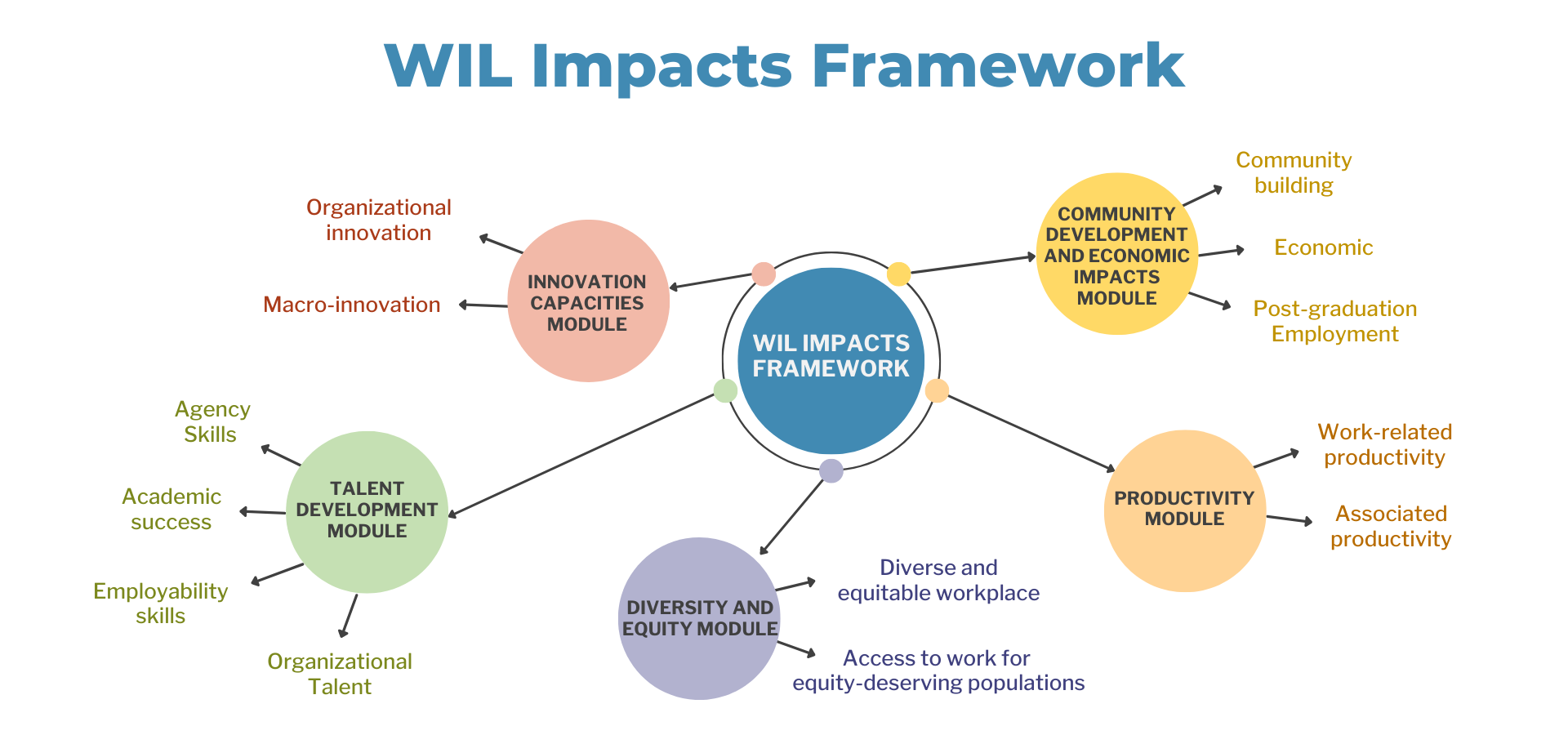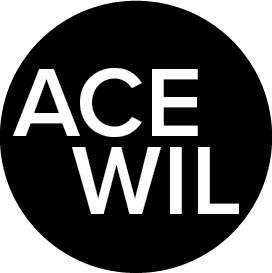The WIL Impacts Framework was developed by the BC Work Integrated Learning Council so that BC’s 25 public, post-secondary institutions could gather valuable data regarding the impacts of work-integrated learning (WIL) experiences on host organizations and the local BC economy.
Project Information
Partner(s): BCIT, Capilano University, College of the Rockies, Langara College, Northern Lights College, Simon Fraser University, Thompsons River University, University of Victoria, Vancouver Community College and Vancouver Island University
Status: Complete
Project Dates: July 6, 2020 — October 28, 2022
Julie Walchli, University of BC
604.827.5194
julie.walchli@ubc.ca
Project Contributors:
This project was led by a Steering Committee composed of: Darrel Bethune, Andrea Giles, Muriel Klemetski, Robyn Leuty, Shawn Longstreet, Stephanie McKeown, Rachel Warick . Dr. Camilo Pena, from UBC’s Planning and Institution Research team, was the Research Analyst on the project.
The WIL Impacts Framework was developed by the BC Work Integrated Learning Council, which is composed of WIL leaders at each of BC’s 25 public, post-secondary institutions (PSIs). The objective of the Council was to develop a framework that PSIs could use to gather valuable data regarding the impacts of work-integrated learning (WIL) experiences on host organizations and the local BC economy.
The WIL Impacts Framework has been designed to capture data beyond the numbers of students and organizations participating in WIL. The Framework is focused on the impacts and benefits of WIL programs and allows PSIs to benchmark their WIL programs across five domains: talent development, productivity, innovation capacities, diversity and equity, and community development and economic impacts.

Impact data has several benefits: it allows PSIs to tell the story of their WIL programs beyond just student participation numbers, with a focus on the socio-economic benefits to employers and the economy more generally. This data has the potential to allow individual programs and/or PSIs to advocate more effectively for support for their WIL programs, greater integration with institutional priorities, and to be clearer on the value proposition of WIL engagement with employers and community partners, ultimately creating more WIL experiences for students.
In future, the Council hopes to use the framework periodically across multiple PSIs to capture snapshots of the socio-economic impacts of post-secondary WIL in BC, which will be valuable when advocating for WIL with senior PSI leaders, government, and other external stakeholders, advocacy which will benefit all PSIs in BC.
WIL Impacts Framework Modules
The WIL Impacts Framework includes a series of documents, featuring each of the domains. Tools for measuring impacts are included, with survey questions for host organizations and post-secondary institutions as well as interview questions. As well, the Framework provides a recommended project plan and timeline, analytic best practices, a listing of works consulted and actual survey samples.
The Framework was designed to be flexible, so that PSIs would have the option of focusing on one or more domains. Although it’s recommended to repeat the data collection periodically to measure changes over time, it is not a requirement.

Community and Economic Impact Module
This Module explains the Community Development and Economic domain and provides detail regarding its three subdomains: community building, economic and post-graduation employment.
WIL Impacts Framework: Community and Economic Impact Module
Diversity and Equity Module
This Module explains the Diversity and Equity domain and provides detail regarding its two subdomains: diverse and equitable workplace, and access to work for equity-deserving populations.
WIL Impacts Framework: Diversity and Equity Module
Innovation Capacities Module
This Module explains the Innovation Capacities domain and provides detail regarding its two subdomains: organizational innovation and macro-innovation.
WIL Impacts Framework: Innovation Capacities
Productivity
Module
This Module explains the Productivity domain and provides detail regarding its two subdomains: work-related productivity and associated productivity.
WIL Impacts Framework: Productivity Module
Talent Development Module
This Module explains the Talent Development domain and provides detail regarding its four subdomains: agency skills, academic success, employability skills and organizational talent.
WIL Impacts Framework: Talent Development ModuleTips for Implementing the Framework

Suggested Project Plan and Timeline Module
While there is a lot of flexibility for PSIs implementing the WIL Impacts Framework, this Module includes suggestions for the project plan, a sample timeline, and subsequent surveys. As well, there are tips for focus groups and identifying WIL hosts and internal staff to survey.
WIL Impacts Framework: Suggested Project Plan and Timeline Module
Analytic Best Practices Module
Once you have your data in hand, it’s time to dive into an analysis to determine key findings. This Module includes tips for analysis, how these indicators are meant to be interpreted, and suggestions for subsequent surveys and trend analysis.
WIL Impacts Framework: Analytic Best Practices ModuleFull Surveys
What follows are the full survey covering all five domains, for you to take and use. It includes a suggested introduction to kick-off the survey and demographic questions. By implementing the survey as-is, without editing the questions or responses, your data will be comparable with any future BC-wide surveys conducted by the BC WIL Council, which will provide additional context when evaluating your WIL programs.

Questionnaire for Post-Secondary Institutions
WIL Impacts Framework: Questionnaire for Post-Secondary InstitutionsSupporting documentation

Development Process
The WIL Impacts Framework was developed following analysis of primary and secondary data collection, first-hand findings, and testing with seven BC WIL Council institutions.
WIL Impacts Framework: Overview
Works Consulted
The WIL Impacts Framework was informed by nearly 40 publications as well as interviews. This document contains details of those publications, for your reference.
WIL Impacts Framework: Works Consulted


